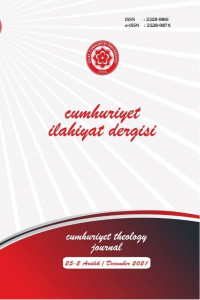Görme Engelliler İçin Toplumsal Bir Kaynak Olarak Hâfızlık
Ḥāfiẓ as a Social Source for the Visually Impaired People
Author(s): Yunus BucukaSubject(s): Education, Theology and Religion, Islam studies
Published by: Cumhuriyet Üniversitesi İlahyat Fakültesi
Keywords: Sociology of Religion; Visually Impaired Person; Ḥāfiẓ; Social Life; Reputation; Employment;
Summary/Abstract: Sacred texts are important sources for all religions. These resources have a variety of social functions, either implicit or explicit. Therefore, it is important to protect and transfer sacred texts in many cultures. For this reason, in many societies, it has become necessary to memorize these texts after they have been written down and to transfer them orally to the next generations. Thus, over time, various structures related to the memorization of these sacred texts have emerged. Being Ḥāfiẓ is an important activity that emerged for the purpose of memorizing the Qur'an and transferring it in this way when necessary and gained historical and social qualities. People who are Ḥāfiẓ are respected Islamic societies. For this reason, many people make an effort to become a Ḥāfiẓ. In this process, reasons contributed to the spread of becoming Ḥāfiẓ, such as the Prophet Muhammed’s encouragement, and the accepting the memorization of the Qur’an as a virtuous activity for Muslims. The research is based on the lives and experiences of visually impaired Ḥāfiẓes. First of all, it aims to contribute to the relevant scientific literature. In addition to its academic contribution, it also aims to be a source for various social policies in order to reveal new options in line with the inclusion of visually impaired individuals in social life. The research is a qualitative descriptive study. It was conducted on the basis of the phenomenology design, which is one of the qualitative research designs. In this direction, it has been tried to understand how visually impaired hafizes ascribe meaning to their lives and how they evaluate the world, society and relationships. The study group of the research consists of twelve visually impaired Ḥāfiẓ residing in the provinces of Bingöl, Elazig, Diyarbakir and Mardin. During the interviews, it was concluded that the sample reached the saturation point due to the repetition of the data, and so the number of participants was limited to twelve. Snowball sampling technique was used in the research. The interviews were conducted with a semi-structured interview form created within the scope of the research. The interviews were conducted in places such as houses, parks, association offices and mosques. The study was carried out with the permission of Bingöl University Scientific Research and Publication Ethics Committee. Various results were obtained by analyzing the data obtained during the research process. Becoming Ḥāfiẓ is accepted as an important element that directly affects the lives of visually impaired participants. For the participants, it has features that make them at peace with themselves, the world and society, illuminate their dark world, and take them out of living within four walls and include them into life. Being an Ḥāfiẓ, playing role in condolences, reciting hymns in mawlids and similar religious ceremonies, giving voluntary Qur'an trainings in mosques or courses are important examples of social activities provided by the Ḥāfiẓes. The participants stated that being a Ḥāfiẓ provided them an important status in the social context and thus they gained respectability. It has been determined that some visually impaired Ḥāfiẓes are employed informally. Many of the participants earn income by reciting mawlids, hymns and eulogies in various religious ceremonies. They also recite the Qur'an in condolences and on some special days. Being Ḥāfiẓ is an important resource for visually impaired individuals to be included in social life. For this reason, the achievements of the visually impaired due to being a Ḥāfiẓ are an example of a model life for both the disabled and the parents with disabled children. In this direction, the visually impaired individuals should be supported in religious music-supported organizations, religious music associations should be established, and courses like mawlidhan, etc. should be organized.
Journal: Cumhuriyet İlahiyat Dergisi
- Issue Year: 25/2021
- Issue No: 2
- Page Range: 619-639
- Page Count: 21
- Language: Turkish

